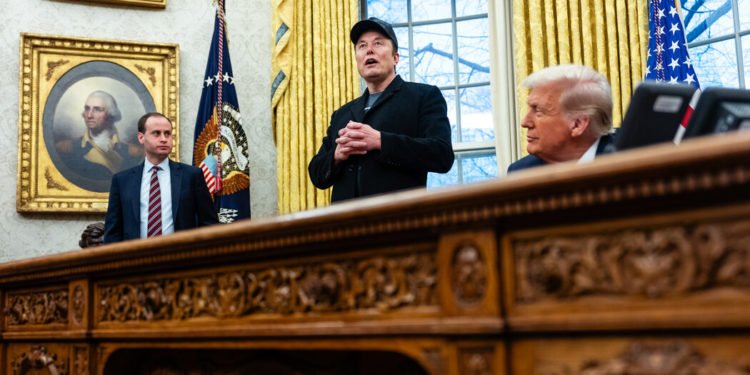WASHINGTON, D.C. — In less than two months since Donald Trump’s second inauguration, Elon Musk has orchestrated an audacious takeover of the federal bureaucracy, wielding unprecedented influence as a private citizen. As head of the Department of Government Efficiency (DOGE), Musk has embedded his team of young engineers and loyalists into the heart of government operations, reshaping agencies with a speed and ferocity that has stunned civil servants and lawmakers alike. This radical overhaul, driven by Musk’s libertarian zeal and disdain for regulatory oversight, marks a seismic shift in how the U.S. government functions.
From Vision to Victory: Musk’s Blueprint
Musk’s journey to bureaucratic dominance began with casual musings at a 2023 dinner party, where he floated the idea of slashing federal inefficiency by gaining control of its digital infrastructure. Fast forward to January 20, 2025—Trump’s first day back in office—and Musk was appointed to lead DOGE, an advisory group with no formal charter but immense executive backing. What followed was a blitzkrieg of action: Musk’s team seized control of the Office of Personnel Management (OPM), commandeered email systems to pressure employees into resigning, and burrowed into sensitive databases across agencies like the IRS and Social Security Administration.
“They moved faster than anyone expected,” said a former OPM official, speaking anonymously due to fear of retaliation. “It was like a hostile takeover of a company, but this was the government.” Musk’s strategy mirrored his 2022 Twitter acquisition—swift, chaotic, and unapologetic—only this time, the stakes were national.
The DOGE Effect: Dismantling the Deep State
Musk’s stated mission is to cut $2 trillion from federal spending, a goal he frames as a democratic mandate. “The people voted for reform, and that’s what they’ll get,” he declared in a recent X post. His team, dubbed the “Doge Kids” by critics, includes Silicon Valley engineers—some as young as 19—lacking government experience but brimming with Musk’s trademark confidence. They’ve targeted agencies like USAID, shutting down its website and locking out staff, while tracing financial flows to choke funding streams.
Republicans cheer the disruption, viewing it as a dismantling of the “deep state.” Democrats, however, decry it as an illegal power grab. “An unelected billionaire is gutting our government,” Senate Minority Leader Chuck Schumer warned. Legal challenges have emerged, with federal courts blocking some DOGE actions, but Musk’s momentum remains unbroken.
A Tech Titan’s Triumph—and Risks
Musk’s corporate empire—SpaceX, Tesla, and xAI—stands to benefit from reduced oversight, raising conflict-of-interest concerns. Critics argue his access to sensitive data, funneled into his AI system Grok, could give him unparalleled economic and political leverage. Yet supporters see a visionary cutting bureaucratic fat, with polls showing Republican approval for his cost-cutting crusade.
The risks are stark. Experts warn of a “brain drain” as experienced civil servants exit, echoing Musk’s Twitter chaos, where mass layoffs led to outages. “This isn’t a startup—you can’t break things and fix them later,” said Robert Gordon, a former Biden administration official. “The government isn’t built for this.”
What’s Next?
As Musk’s takeover unfolds, the battle lines are drawn. Congress faces pressure to curb his authority, while Trump doubles down, signing orders to expand DOGE’s reach. Whether this experiment yields efficiency or calamity remains unclear—but for now, Elon Musk holds the reins of America’s bureaucracy in a way no private citizen ever has.
